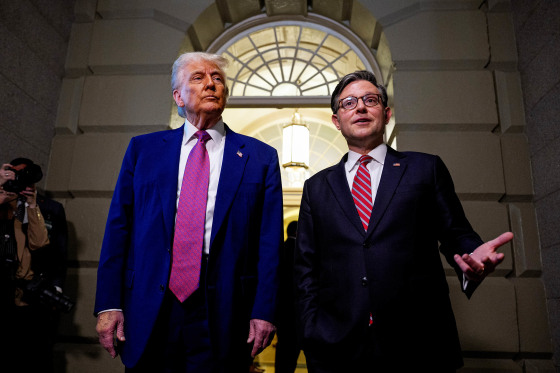In his farewell address to the nation more than 200 years ago, President George Washington warned the branches of government to “confine themselves within their respective Constitutional spheres.” Encroachment on other branches, he wrote, “tends to consolidate the powers of all the departments in one, and thus to create, whatever the form of government, a real despotism.”
Today’s Republican Party never heard that advice. GOP majorities in the House and Senate have stood by as President Donald Trump has brazenly usurped congressional authority and evaded court rulings. But apparently that is not enough for them demonstrate their fealty to such a despotic executive.
This provision was clearly written with the current administration in mind.
Now, the House GOP caucus is using the recently passed One Big Beautiful Bill Act to try to further insulate the president from judicial accountability. Republicans snuck in a little noticed but very important provision into the megabill that would effectively remove from judges the ability to hold litigants who defy court orders in contempt. If the provision becomes law, it would be an unmitigated disaster for the Constitution and the country.
At the end of page 562 of the 1,118-page bill, a brief section entitled “Restriction on Enforcement” says:
No court of the United States may enforce a contempt citation for failure to comply with an injunction or temporary restraining order if no security was given when the injunction or order was issued pursuant to Federal Rule of Civil Procedure 65(c) whether issued prior to, on, or subsequent to the date of enactment of this section.”
Rule 65(c) says judges may only issue preliminary injunctions or temporary restraining orders if litigants provide a security bond “in an amount that the court considers proper to pay the costs and damages sustained by any party found to have been wrongfully enjoined or restrained.” Judges have wide discretion on that amount, and, as The Intercept’s Shawn Musgrave notes, the rule requiring such a financial guarantee is “generally relaxed when the lawsuit alleges illegal conduct by the government.”
But no more, if House Republicans get their way. Under this provision, anyone seeking an injunction or restraining order would have to put up a financial bond, in an amount determined by the judge in the case, if the litigants wanted to keep alive that judge’s contempt power. As Erwin Chemerinsky, dean of UC Berkeley School of Law, writes,“Those seeking such court orders generally do not have the resources to post a bond, and insisting on it would immunize unconstitutional government conduct from judicial review.”

Whether the provision survives the Senate is unclear. The megabill is being passed under the budget reconciliation process, which is supposed to be used only for fiscal matters. A change to the rules around contempt would appear to be disqualified under that process, but already Senate Republicans have shown willingness to play fast and loose with the chamber’s procedures. If it does survive, the provision will go a long way toward neutering the courts and do more to insulate Trump from accountability than anything since the Supreme Court’s scandalous decision all but eliminating the president’s criminal liability.
This provision was clearly written with the current administration in mind. Note its seemingly odd application only to injunctions and restraining orders rather than to any use of the contempt power. And recall the number of times since Jan. 20 that courts have issued them to stop the administration from violating the law.
Retroactive application of a newly enacted law is always problematic.
If that wasn’t enough to signal the way this provision would help the president, consider the part that would apply it to every order entered “prior to” its enactment — all temporary restraining orders, preliminary injunctions and permanent injunctions. Conveniently, in none of the cases previously filed against the Trump administration has the security or the bonding requirement been fulfilled.
Retroactive application of a newly enacted law is always problematic, and especially so in this instance. If this provision of the One Big Beautiful Bill Act becomes law, the judicial branch, which so far has done almost all the work of checking the administration will have an even harder time doing so.
Without the power to hold parties in contempt, a restraining order or injunction issued is more a request than a command. Administration officials must be salivating. They know that contempt is a crucial weapon in the arsenal of any judge. It is used most often when one of the parties to a lawsuit or their attorneys disrupts court proceedings or disrespects the judge — what is known as “direct contempt.” In such cases, the judge can hold someone in contempt without any kind of hearing.
Indirect contempt, on the other hand, occurs when a party ordered by the court to do, or refrain from doing, something fails to follow the court order. That is at issue in several high-profile cases, including the wrongful deportation of Kilmar Abrego Garcia.
The contempt power traces its origins to 14th-century England. In the Judiciary Act of 1789, Congress gave American courts the authority “to punish by fine or imprisonment ... all contempts of authority in any cause or hearing before the same.” In 1873, the Supreme Court said, “The power to punish for contempts is inherent in all courts; its existence is essential to the preservation of order in judicial proceedings, and to the enforcement of the judgments, orders, and writs of the courts, and consequently to the due administration of justice.”

“The moment the courts of the United States,” the high court argued, “were called into existence and invested with jurisdiction over any subject, they became possessed of this power.”
In 1924, the Court reaffirmed this view. Justice George Sutherland, in his majority opinion, explained, “The power to punish for contempts is inherent in all courts has been many times decided, and may be regarded as settled law. It is essential to the administration of justice.”
At that time, the court acknowledged Congress’ right to make rules regarding the contempt power. But, as Sutherland noted, “the attributes which inhere in that power and are inseparable from it can neither be abrogated nor rendered practically inoperative.” House Republicans’ version of the One Big Beautiful Bill Act would render the contempt power “practically inoperative,” expressing the same cavalier attitude toward the judicial branch as the current president.
In light of the provision’s dubious constitutional foundation, the first response to the GOP’s effort should be political, not legal. Now would be a good time for Republicans in the Senate who call themselves “constitutionalists” to stand up and be counted. Or, failing that, for Americans to shame them into doing so.
